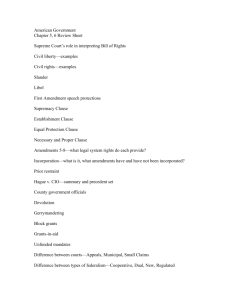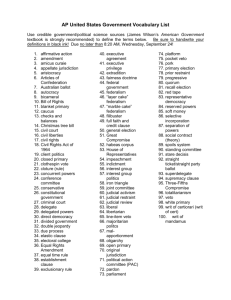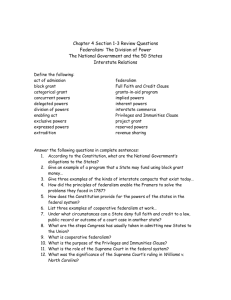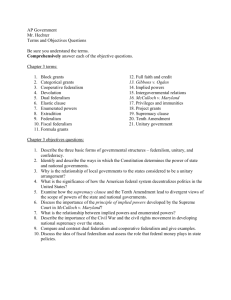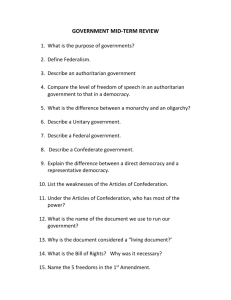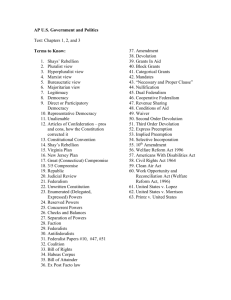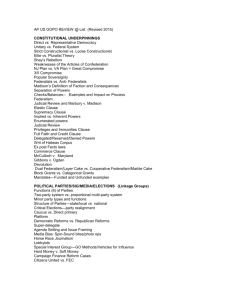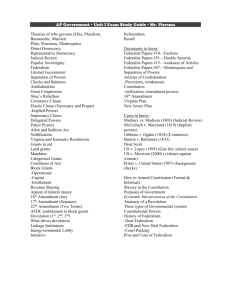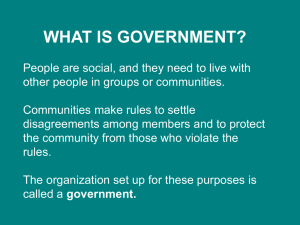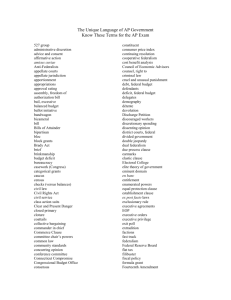AP US Government & Politics Unit 1 Review Sheet
advertisement
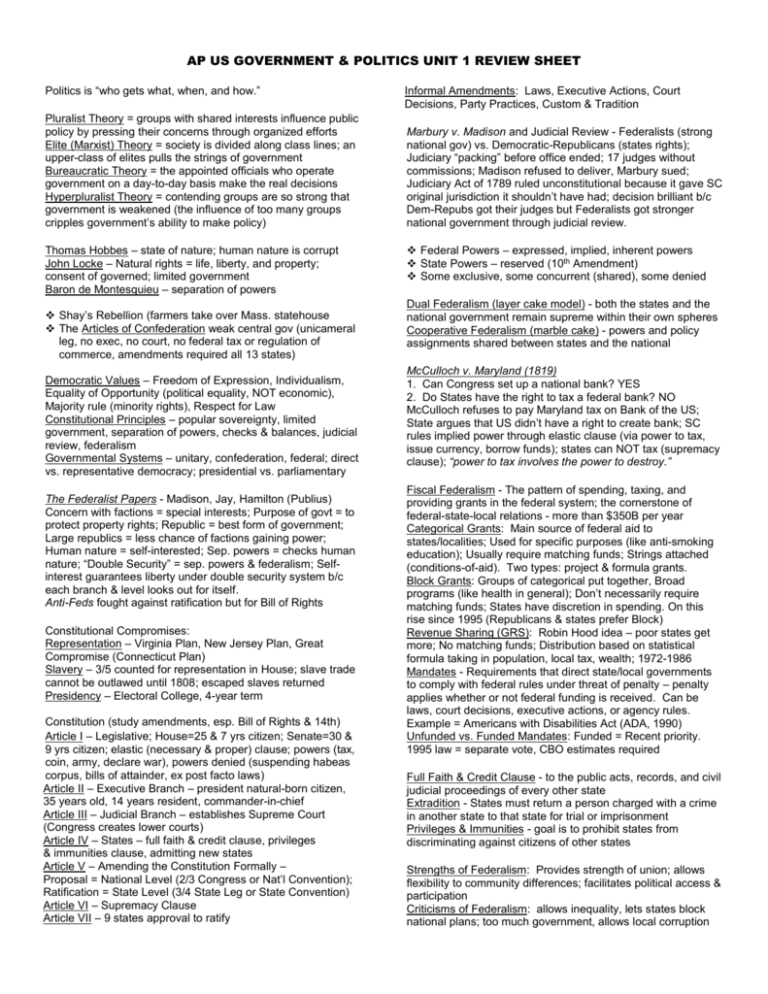
AP US GOVERNMENT & POLITICS UNIT 1 REVIEW SHEET Politics is “who gets what, when, and how.” Pluralist Theory = groups with shared interests influence public policy by pressing their concerns through organized efforts Elite (Marxist) Theory = society is divided along class lines; an upper-class of elites pulls the strings of government Bureaucratic Theory = the appointed officials who operate government on a day-to-day basis make the real decisions Hyperpluralist Theory = contending groups are so strong that government is weakened (the influence of too many groups cripples government’s ability to make policy) Thomas Hobbes – state of nature; human nature is corrupt John Locke – Natural rights = life, liberty, and property; consent of governed; limited government Baron de Montesquieu – separation of powers Shay’s Rebellion (farmers take over Mass. statehouse The Articles of Confederation weak central gov (unicameral leg, no exec, no court, no federal tax or regulation of commerce, amendments required all 13 states) Democratic Values – Freedom of Expression, Individualism, Equality of Opportunity (political equality, NOT economic), Majority rule (minority rights), Respect for Law Constitutional Principles – popular sovereignty, limited government, separation of powers, checks & balances, judicial review, federalism Governmental Systems – unitary, confederation, federal; direct vs. representative democracy; presidential vs. parliamentary The Federalist Papers - Madison, Jay, Hamilton (Publius) Concern with factions = special interests; Purpose of govt = to protect property rights; Republic = best form of government; Large republics = less chance of factions gaining power; Human nature = self-interested; Sep. powers = checks human nature; “Double Security” = sep. powers & federalism; Selfinterest guarantees liberty under double security system b/c each branch & level looks out for itself. Anti-Feds fought against ratification but for Bill of Rights Constitutional Compromises: Representation – Virginia Plan, New Jersey Plan, Great Compromise (Connecticut Plan) Slavery – 3/5 counted for representation in House; slave trade cannot be outlawed until 1808; escaped slaves returned Presidency – Electoral College, 4-year term Constitution (study amendments, esp. Bill of Rights & 14th) Article I – Legislative; House=25 & 7 yrs citizen; Senate=30 & 9 yrs citizen; elastic (necessary & proper) clause; powers (tax, coin, army, declare war), powers denied (suspending habeas corpus, bills of attainder, ex post facto laws) Article II – Executive Branch – president natural-born citizen, 35 years old, 14 years resident, commander-in-chief Article III – Judicial Branch – establishes Supreme Court (Congress creates lower courts) Article IV – States – full faith & credit clause, privileges & immunities clause, admitting new states Article V – Amending the Constitution Formally – Proposal = National Level (2/3 Congress or Nat’l Convention); Ratification = State Level (3/4 State Leg or State Convention) Article VI – Supremacy Clause Article VII – 9 states approval to ratify Informal Amendments: Laws, Executive Actions, Court Decisions, Party Practices, Custom & Tradition Marbury v. Madison and Judicial Review - Federalists (strong national gov) vs. Democratic-Republicans (states rights); Judiciary “packing” before office ended; 17 judges without commissions; Madison refused to deliver, Marbury sued; Judiciary Act of 1789 ruled unconstitutional because it gave SC original jurisdiction it shouldn’t have had; decision brilliant b/c Dem-Repubs got their judges but Federalists got stronger national government through judicial review. Federal Powers – expressed, implied, inherent powers State Powers – reserved (10th Amendment) Some exclusive, some concurrent (shared), some denied Dual Federalism (layer cake model) - both the states and the national government remain supreme within their own spheres Cooperative Federalism (marble cake) - powers and policy assignments shared between states and the national McCulloch v. Maryland (1819) 1. Can Congress set up a national bank? YES 2. Do States have the right to tax a federal bank? NO McCulloch refuses to pay Maryland tax on Bank of the US; State argues that US didn’t have a right to create bank; SC rules implied power through elastic clause (via power to tax, issue currency, borrow funds); states can NOT tax (supremacy clause); “power to tax involves the power to destroy.” Fiscal Federalism - The pattern of spending, taxing, and providing grants in the federal system; the cornerstone of federal-state-local relations - more than $350B per year Categorical Grants: Main source of federal aid to states/localities; Used for specific purposes (like anti-smoking education); Usually require matching funds; Strings attached (conditions-of-aid). Two types: project & formula grants. Block Grants: Groups of categorical put together, Broad programs (like health in general); Don’t necessarily require matching funds; States have discretion in spending. On this rise since 1995 (Republicans & states prefer Block) Revenue Sharing (GRS): Robin Hood idea – poor states get more; No matching funds; Distribution based on statistical formula taking in population, local tax, wealth; 1972-1986 Mandates - Requirements that direct state/local governments to comply with federal rules under threat of penalty – penalty applies whether or not federal funding is received. Can be laws, court decisions, executive actions, or agency rules. Example = Americans with Disabilities Act (ADA, 1990) Unfunded vs. Funded Mandates: Funded = Recent priority. 1995 law = separate vote, CBO estimates required Full Faith & Credit Clause - to the public acts, records, and civil judicial proceedings of every other state Extradition - States must return a person charged with a crime in another state to that state for trial or imprisonment Privileges & Immunities - goal is to prohibit states from discriminating against citizens of other states Strengths of Federalism: Provides strength of union; allows flexibility to community differences; facilitates political access & participation Criticisms of Federalism: allows inequality, lets states block national plans; too much government, allows local corruption

